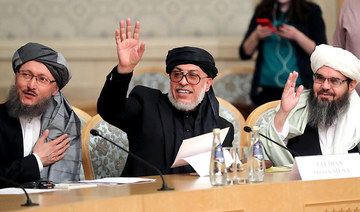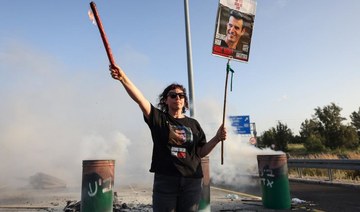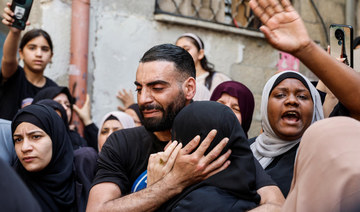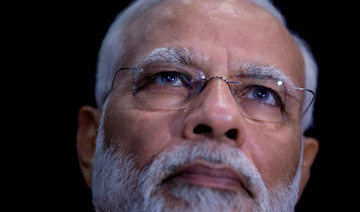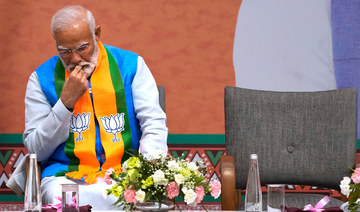WASHINGTON: America’s longest war has come full circle.
The United States began bombing Afghanistan after the attacks of Sept. 11, 2001, to root out Al-Qaeda fighters harbored by the Taliban. Now, more than 18 years later, preventing Afghanistan from being a launching pad for more attacks on America is at the heart of ongoing US talks with the Taliban.
President Donald Trump’s envoy at the negotiating table says he’s satisfied with the Taliban’s commitment to prevent international terrorist organizations from using Afghanistan as a base to plot global attacks. There’s even talk that a negotiated settlement might result in the Taliban joining the US to fight Daesh militants, rivals whose footprint is growing in mountainous northern Afghanistan.
“The world needs to be sure that Afghanistan will not be a threat to the international community,” said the envoy, Zalmay Khalilzad, who was born in Afghanistan and is a former US ambassador to Afghanistan. “We are satisfied with the commitment that we have received (from the Taliban) on counterterrorism.”
Not everyone is convinced.
Some Afghans worry that Trump’s desire to pull American troops from Afghanistan will override doubts about the Taliban’s sincerity. Early in the talks, Hamdullah Mohib, national security adviser to Afghan President Ashraf Ghani, said counting on the Taliban to control other militants could be like “having cats guard the milk.”
Rep. Michael Waltz, who did multiple combat tours in Afghanistan as a US special forces officer, said he’s happy to see the Taliban are negotiating but does not see how Afghanistan can keep from becoming a hotbed for terrorists wanting to strike the United States.
“I have my doubts about the Taliban’s sincerity No. 1,” said Waltz, R-Fla. “But even if you buy into that ... how does the Taliban have the capability to enforce what a 300,000-man Afghan army, the United States forces and a coalition of armies around the world are continuing to struggle to do?“
Much is at stake.
The conflict in Afghanistan has cost more than 2,300 American lives and hundreds of billions in taxpayer dollars. The Taliban control roughly half the country, although not the cities. About 14,000 US troops plus other NATO-led forces are still there. Senior intelligence officials have warned that a withdrawal could return Afghanistan to a time when the Taliban ruled a country that was an Al-Qaeda stronghold.
Despite nearly two decades of war, militant groups remain.
A UN Security Council report in April 2018 said Al-Qaeda was “closely allied with and embedded within the Taliban.” The report said the Taliban, which have no history of conducting attacks outside Afghanistan, provide operating space for about 20 terrorist groups with thousands of fighters.
Bill Roggio, editor of the Long War Journal at the Foundation for Defense of Democracies, a conservative think tank in Washington, cites a video Al-Qaeda released in May that highlights its alliance with the Taliban and shows an image of militants fighting together under both Al-Qaeda and Taliban flags.
“The Taliban has not renounced Al-Qaeda nor is it likely to do so,” Roggio said. “The two remain close allies. The Taliban refused to hand over Osama bin Laden after 9/11 and was willing to sacrifice its control of the country. The Taliban has the upper hand now. There are no incentives to denounce its closest ally.”
A US intelligence official based in Kabul, the Afghan capital, told The Associated Press that the Daesh group is an even bigger threat. The official, who discussed terrorist threats only on condition of anonymity, said recent IS attacks in Kabul are “practice runs” for more substantial ones in the future. The official said “one of the hopes of a negotiated settlement is that it will bring the Taliban into the government and into the fight against IS.”
The Daesh group has expanded into eastern Kunar Province, where the US was forced to withdraw after several punishing attacks from the Taliban. That’s one reason the US wants to co-opt the Taliban: They clearly know the terrain and can take the fight to Islamic State forces.
Such an alignment is hardly unheard of. During the 1980s, the US backed Islamic insurgents in Afghanistan as they battled to end the occupation of the former Soviet Union.
Khalilzad hasn’t specifically said why he’s satisfied with the Taliban’s guarantee that it will prevent attacks from being plotted on Afghan soil. He says only that the “US military withdrawal will be linked to the commitments the Taliban are making.”
Suhail Shaheen, spokesman for the Taliban’s political office in Doha, Qatar, said such guarantees will be written into law once US and NATO troops leave the country.
“After withdrawal of foreign troops from the country and formation of a new Islamic government, legislation will be made that no one can use the soil of Afghanistan against US and its allies,” Shaheen said.
John Dempsey, senior adviser in the State Department’s Bureau for South and Central Asia, said Khalilzad not only has been given assurances from the Taliban but also is discussing ways the US will be able to verify them.
“He’s not going into the discussions naively and taking them at their word,” Dempsey said. “He’s in discussions on putting in place verification and enforcement and implementation guarantees. We’re not there yet.”
CIA Director Gina Haspel was asked about verification at a Senate hearing this year.
“If there were an eventual peace agreement, a very robust monitoring regime would be critical and we would still need to retain the capability to act in our national interest if we needed to,” Haspel said.
But Taliban spokesman Zabihullah told the AP that “neither the presence of American military nor intelligence is acceptable to us.”
Dempsey said that by Sept. 1, the US wants to resolve the issue about terrorist groups using Afghanistan to plot attacks and wants to draft a timeline for withdrawing troops. That agreement would allow more progress to be made in ongoing talks between the Taliban and Afghans. Women are especially fearful about the future because they were harshly repressed when the Taliban ruled the country from 1996 to 2001.
With deep ethnic fissures in the country and the Taliban’s refusal — so far — to negotiate with the current Afghan government, which it sees as a puppet of the West, these Afghan-to-Afghan talks are expected to be even harder than the US direct talks with the Taliban.
Taliban vows future Afghanistan won’t be terrorists’ hotbed
Taliban vows future Afghanistan won’t be terrorists’ hotbed
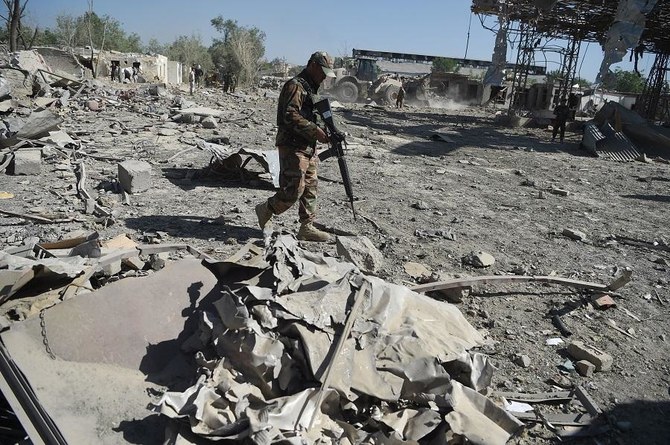
- A US envoy says he’s satisfied with the Taliban’s commitment to prevent international terrorist organizations from using Afghanistan as a base to plot global attacks
- The US began bombing Afghanistan after the attacks of Sept. 11, 2001, to root out Al-Qaeda fighters harbored by the Taliban
US campus protests wane after crackdowns, Biden rebuke
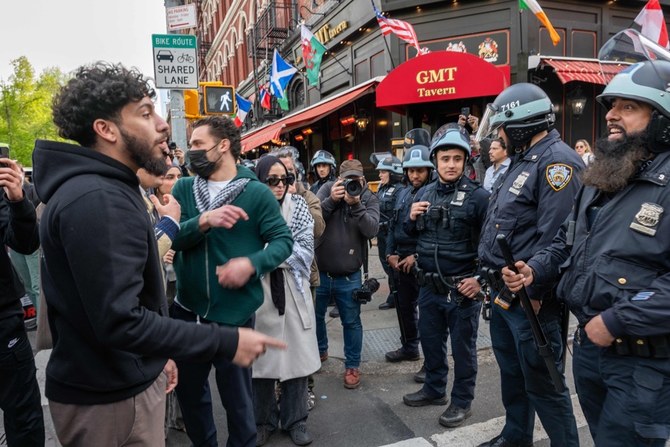
- More than 2,000 arrests have been made in the past two weeks across the US
NEW YORK: Pro-Palestinian protests that have rocked US campuses for weeks were more muted Friday after a series of clashes with police, mass arrests and a stern White House directive to restore order.
Police in Manhattan cleared an encampment at New York University after sunrise, with video posted to social media by an official showing protesters exiting their tents and dispersing when ordered to do so.
The scene appeared relatively calm compared to crackdowns at other campuses around the country — and some worldwide — where protests over Israel’s war against Hamas in Gaza have multiplied in recent weeks.
University administrators, who have tried to balance the right to protest and complaints of violence and hate speech, have increasingly called on police to clear out the demonstrators ahead of year-end exams and graduation ceremonies.
At the University of Chicago, law enforcement appeared set to dismantle an encampment Friday after the school’s president said talks with protesters on a compromise had failed.
Before the clearing operation began, dozens of American flag-wielding counter-protesters showed up and confronted the pro-Palestinian group, but police separated the two sides, local media reported.
More than 2,000 arrests have been made in the past two weeks across the US, some during violent confrontations with police, giving rise to accusations of use of excessive force.
President Joe Biden, who has faced pressure from all political sides over the conflict in Gaza, gave his first expansive remarks on the protests Thursday, saying that “order must prevail.”
“We are not an authoritarian nation where we silence people or squash dissent,” Biden said in a brief address from the White House.
“But neither are we a lawless country. We’re a civil society, and order must prevail.”
His remarks came hours after police moved in on demonstrators at the University of California, Los Angeles, which had seen a violent confrontation when counter-protesters attacked a fortified encampment there.
A large police contingent forcibly cleared the sprawling encampment early Thursday while flashbangs were launched to disperse crowds gathered outside.
Schools officials said that more than 200 people were arrested.
On the US East coast Thursday, protesters at New Jersey’s Rutgers University agreed to take down their camp after reaching a compromise with administrators — a similar deal to one made at Brown University in Rhode Island.
Republicans have accused Biden of being soft on what they say is anti-Semitic sentiment among the protesters, while he faces opposition in his own party for his strong support for Israel’s military offensive.
“There should be no place on any campus, no place in America for anti-Semitism, or threats of violence against Jewish students,” Biden said.
Education Secretary Miguel Cardona echoed the condemnation in a letter to university leaders on Friday, pledging to investigate reports of anti-Semitism “aggressively,” CNN reported.
Meanwhile, similar student protests have popped up in countries around the world, including in Australia, France, Mexico and Canada.
In Paris, police moved in to clear students staging a sit-in at the Sciences Po university.
An encampment has grown at Canada’s prestigious McGill University, where administrators on Wednesday demanded it be taken down “without delay.”
However, police had yet to take action against the site as of Friday.
The Gaza war started when Hamas militants staged an unprecedented attack on Israel on October 7 that resulted in the deaths of more than 1,170 people, mostly civilians, according to an AFP tally of Israeli official figures.
Israel estimates that 128 hostages remain in Gaza. The Israeli military says 35 of them are dead.
Israel’s retaliatory offensive has killed more than 34,600 people in Gaza, mostly women and children, according to the Hamas-run territory’s health ministry.
Biden to host Jordan king next week amid Gaza talks

- Hamas accused Israeli Prime Minister Benjamin Netanyahu on Friday of trying to derail the proposed Gaza deal with his threats to launch an operation in Rafah
- Israel has killed more than 34,000 Palestinians in Gaza, mostly women and children, according to the health ministry in the Hamas-run territory
WASHINGTON: US President Joe Biden will host Jordan’s King Abdullah II next week, the White House said Friday, as negotiations continue in the Middle East for a ceasefire in Gaza.
The meeting will be “private” and will be followed by a readout, White House Press Secretary Karine Jean-Pierre told reporters, without giving a date for the encounter.
The meeting comes against the backdrop of talks for a deal to release hostages and secure a ceasefire between Israel and Hamas in Gaza after nearly seven months of war.
The talks, which come after months of efforts by mediators Egypt, Qatar and the United States to broker a new agreement between the combatants, are at a critical juncture.
The United States has urged the Palestinian militant group to accept the “extraordinarily generous” offer.
But Hamas accused Israeli Prime Minister Benjamin Netanyahu on Friday of trying to derail the proposed Gaza deal with his threats to launch an operation in Rafah.
King Abdullah II last visited the White House in February when he called for an immediate ceasefire and warned an attack on Rafah would cause a “humanitarian catastrophe.”
In April, Jordan worked alongside the United States and other allies to shoot down Iranian drones that Tehran sent toward Israel, with the kingdom keen to avoid a wider conflict.
Austin: No indication Hamas planning attack on US troops

- Israel has killed more than 34,000 Palestinians, according to Gaza’s Health Ministry
WASHINGTON: US Defense Secretary Lloyd Austin said he did not see any indication Hamas was planning any attack on US troops in Gaza but added adequate measures were being put in place for the safety of military personnel.
“I don’t discuss intelligence information at the podium. But I don’t see any indications currently that there is an active intent to do that,” Austin said during a press briefing.
“Having said that ... this is a combat zone and a number of things can happen, and a number of things will happen.”
Austin’s remarks came as the US military said it was temporarily pausing the offshore construction of a maritime pier because of weather conditions and instead would continue building it at the Israeli Port of Ashdod.
FASTFACT
The US military says it is temporarily pausing the offshore construction of a maritime pier because of weather conditions.
The maritime pier, once built, will be placed off the coast of Gaza in a bid to speed the flow of humanitarian aid into the enclave.
“Forecasted high winds and high sea swells caused unsafe conditions for soldiers working on the surface of the partially constructed pier,” the US military said in a statement.
“The partially built pier and military vessels involved in its construction have moved to the Port of Ashdod, where assembly will continue,” it added.
Earlier this week, the Pentagon said about 50 percent of the pier had been constructed.
Israel has sought to demonstrate it is not blocking aid to Gaza, especially since President Joe Biden issued a stark warning to Prime Minister Benjamin Netanyahu, saying Washington’s policy could shift if Israel fails to take steps to address civilian harm, humanitarian suffering, and the safety of aid workers.
US officials and aid groups say some progress has been made but warn it is insufficient, amid stark warnings of imminent famine among Gaza’s 2.3 million people.
The humanitarian situation in Gaza — which has been devastated by more than six months of Israeli operations against Hamas — remains dire, with a senior US administration official saying last week that the territory’s entire population of 2.2 million people is facing food insecurity.
Canada police charge three with murder of Sikh leader Nijjar

- Nijjar was a Canadian citizen campaigning for the creation of Khalistan, an independent Sikh homeland
OTTAWA: Canadian police said on Friday they had arrested and charged three Indian nationals with the murder of Sikh separatist leader Hardeep Singh Nijjar in June 2023 and said they were probing possible links to the Indian government.
Nijjar, 45, was shot dead outside a Sikh temple in Surrey, a Vancouver suburb with a large Sikh population. Canadian Prime Minister Justin Trudeau has cited evidence of Indian government involvement, prompting a diplomatic crisis with New Delhi.
Assistant Commissioner David Teboul said the matter was still under investigation and other probes were being carried out. These “include investigating connections to the government of India,” he told a televised news conference.
Nijjar was a Canadian citizen campaigning for the creation of Khalistan, an independent Sikh homeland carved out of India. The presence of Sikh separatist groups in Canada has long frustrated New Delhi, which had labeled Nijjar a “terrorist.”
Last week the White House expressed concern about the reported role of the Indian intelligence service in assassination plots in Canada and the United States.
India’s Rahul Gandhi to contest elections from family borough

- Gandhi contests polls from second seat in family bastion
- Emotional moment to contest from Raebareli, Gandhi says
NEW DELHI: Indian opposition leader Rahul Gandhi will contest the general election from the family bastion in the north, his Congress Party announced on Friday, a move that will challenge Prime Minister Narendra Modi in a region he dominates.
Gandhi, the scion of the Nehru-Gandhi dynasty, will contest from Raebareli in politically crucial Uttar Pradesh state, Congress said, in addition to Wayanad in Kerala state in the south, which has already voted. India allows candidates to contest multiple constituencies but they can represent only one.
Uttar Pradesh is India’s most populous state and elects 80 lawmakers to the lower house of parliament, the most of any state. In the last election in 2019, Modi’s Bharatiya Janata Party and allies won 64 seats, including from Amethi, adjacent to Raebareli, where Gandhi was defeated.
His return to the area, albeit for a second constituency, will invigorate the party, Congress officials said.
Gandhi said being nominated from Raebareli was an “emotional moment” for him.
“My mother has entrusted me with the responsibility ... with great confidence and given me the opportunity to serve it,” he posted on X.
“In the ongoing battle for justice and against injustice, I seek the love and blessings of my loved ones. I am confident that all of you are standing with me in this battle to save the constitution and democracy,” he said.
Gandhi’s mother Sonia won from Raebareli in 2019, which has returned a Congress candidate in 17 of the 20 elections held there since 1952, mostly members of the Gandhi family. Sonia Gandhi is now a member of the upper house of parliament.
Modi is widely expected to win a rare third term in the general election that got underway on April 19 and concludes on June 1, with votes set to be counted on June 4.
However, analysts say a low voter turnout in the first two phases of the seven-phase election has dampened hopes of a huge majority for the party, although they said the BJP was still likely to retain power in the world’s most populous nation.
Soon after the announcement, Gandhi flew to Raebareli in a private aircraft, accompanied by his mother Sonia, sister Priyanka and senior Congress leaders, and filed his nomination papers.
Modi and the BJP attacked Gandhi for the decision.
“I had said that the prince will lose in Wayanad and in fear of his loss ... he will look for another seat,” Modi said on Friday, referring to Gandhi.
“I also want to tell them wholeheartedly, do not be afraid, do not run away,” Modi said.
Congress has ruled India for 54 of its 76 years since independence from Britain, and members of the Nehru-Gandhi family were prime ministers for more than 37 of those 54 years.
However, the party has floundered since it was swept out of power by Modi in 2014 and has been struggling to revive itself.
Gandhi contesting from Raebareli is good news for the opposition INDIA alliance of 27 parties that Congress leads, said Rasheed Kidwai, political analyst and visiting fellow at New Delhi’s Observer Research Foundation.
“The significance of Rahul contesting here is that it will boost the alliance with Samajwadi Party,” Kidwai said referring to the regional partner of Congress in Uttar Pradesh. “The opposition story is not all that bad and this will force a contest with BJP.”



